- Home
- Douglas Niles
The Golden Orb i-2
The Golden Orb i-2 Read online
The Golden Orb
( Icewall - 2 )
Douglas Niles
Douglas Niles
The Golden Orb
1
The Alchemist
There was a place on the world of Krynn, a remote land lying far to the south of the great centers of civilizations, isolated by ice and ocean from realms of elves and dwarves, beyond the ken of Istaran priests and Solamnic Knights. That place was called the Icereach, and it was home to bears and seals, glaciers and walrus-men, landscapes of flat tundra and craggy summits.
The cold and rugged land was also host to populations of ogres and men, the former in their ancient kingdom of Suderhold, the latter in scattered strongholds of the Arktos and Highlander tribes.
By many standards the Icereach was a poor land, producing but a small amount of food and supporting a limited population-limited, at least, when contrasted to the teeming multitudes inhabiting the fertile pastures of the Abanasinian plains or thriving on the rich fisheries of the Newsea. While fields greened for the harvest and grapevines grew heavy with fruit on the continent of Ansalon, the denizens of the Icereach counted themselves lucky to find scattered berries in the river valleys, or to take a crop of wheat or barley from a rocky hillside field. The hardiest plants grew quickly during a short season of very long days.
The Icereach was surrounded by water and ice, defined by a radical pattern of changing seasons, extremes of weather unknown upon the rest of Krynn. The place was further marked by a great barrier of cliff, the Ice-wall, looming a mile above the flat tundra in some places, in others scoring a great rift through the frost-scarred mountains. The wall was the barrier between the land of vitality and the farthest southern reaches of Krynn, where mountains were the only denizens, rock and ice the rugged heights’ sole occupants. In the coldest season, while the blanket of snow spread across all parts of the land and water alike, the ceaseless blackness of the night sky offered contrast to the blanket whiteness of the landscape.
When spring came to the Icereach, the sun poked into view gradually, at first for only an hour or two at a time but each day rising higher, casting more light across the snow-draped landscape. Gradually the snowfields melted, streams cascading into life until, finally, the wintry cloak became a patchwork cover revealing the barren stone and frost-browned grasses covering the ground. Snowmelt came to the north-facing slopes initially-they were the first to feel the kiss of the returning sun-but soon it spread across the flat tundra, liquefying the ice-capped seas.
Summer was the time when the land truly came to life, blessed by a sun that remained constant, never dropping below the horizon for a span of three full months. Flowers burst into blossom under this day without end, while animals ranging from bears and deer to plump grouse and sleek seals fed and mated and thrived under the blessing of perpetual warmth and daylight. Fish spawned in sparkling streams, and great whales basked in the sun-drenched seas. Humans and ogres, too, busied themselves in their multitude of tasks. Men spent their time hunting and foraging, mining for gold and iron and coal, or planting crops and catching fish. The ogres did some of these things as well, but mostly they made war on humans so that they could steal the products of man’s diligent labors.
As it did for the rest of the world, autumn brought a time of darkening to the Icereach, a sobering transition that sent animals seeking shelter and men making preparations for the upcoming winter. Crops were harvested, meat salted and smoked, lodges and boats secured against the inevitable and imminent storm. The span of daylight grew short until the sun barely poked above the northern horizon for a few hours, before and after the noon of each day. With every progressive sunset the interval of darkness became longer and the coming winter loomed closer.
When winter burst upon the Icereach, the fury of the Sturmfrost was unleashed. In so many ways this mighty storm, unknown to the rest of Krynn, defined the harsh extremes of this polar land. Throughout the year the tempest gathered pressure but contained its fury behind the barrier of the Icewall. During the waning days of fall, seething and churning with cyclonic force, the storm’s strength swelled, icy winds chipping away at the stone and frost that formed the bedrock of its wintry world. Finally, when the Sturmfrost could no longer be contained, the blizzard erupted on the land, snarling over the Icewall like ten thousand hungry bears, roaring across the domains of ogres and men alike. Seas froze under the impact of the frigid blast, and any greenery left upon the land immediately succumbed to the killing chill.
Fish dove deep in their seas to languish in the light-less depths. Animals cowered in dens, slumbering through the months of darkness, surviving on the fat their bodies had stored during the season of plenty. If they had not accumulated a sufficient reserve of this fat, they died.
Even ogres and especially humans quailed against the onslaught of the Sturmfrost. Everywhere mankind retired to shelters, be they the great citadels of the Highlanders or the snug lodges of the Arktos. The lucky ones dwelt within the high walls of Brackenrock, the great fortress held by the Bayguard tribe. Vast wells of subterranean steam vented through the halls of Brackenrock, allowing those fortunate denizens to exist in comfort and warmth unknown to the rest of the Icereach’s humans.
The ogres had their own capital, the great mountain city of Winterheim. Like Brackenrock it was heated by the world’s natural steam, making a cavernous subterranean shelter of benign, even luxurious, comfort for thousands of ogres and their even more numerous human slaves. Winterheim was a great mountain, mightiest summit of Icereach, and much of the massif was hollowed into living space for the ogres who had dwelt there for more than four thousand years.
Beyond Winterheim and Brackenrock, the sentient denizens of the Icereach lived a hardier life, battling the elements even within their shelters: fires that needed constant replenishment of fuel, windows and doors that required never-ending attention, lest encroaching wind and snow claw their way inward. The Sturmfrost attacked not like a blizzard or any other violence born of nature. Instead, it was like a savage and malevolent being. Chunks of ice, some of them bigger than large houses, flew through the blinding gale, blasting with meteoric force any obstacles in their path. Stinging needles of ice flayed the flesh from anyone foolish enough to be caught in the open. The surface of the sea froze with the first minutes of the onslaught, trapping unwary boats in the water. Later, more gradually, the winter would crush the hulls under the inexorable pressure of the expanding, remorseless ice pack.
The Sturmfrost was accustomed to rage in full fury for a month or six weeks every winter, a period of utter, sunless night. Very gradually, the force of the epic blizzard would fade. Winds still came howling up from the south, and snow swept the landscape in storms that remained frequent, but these were broken by increasing periods of preternatural calm. During frigid intervals the skies cleared. Though the temperature remained well below freezing, one who bundled against the cold could safely view a dazzling array of stars. A number of weeks, perhaps even a couple of months of winter, passed before the sun again appeared, but the waning of the storm was inevitable and each year gave hope to the people. Those who had survived the Sturmfrost truly believed they could survive anything.
Even when the violence of the storm had passed, of course, there were many who never dared to emerge into the long, cold night. They remained within lodges and dens, citadels or city, until the winter was truly past and spring began to brighten the Icereach. In the vast landscape of the Icereach there were many remote outposts of men and ogres alike, places buried in deep snow and ice.
One of these remote locales was an island, an ogre territory rising in the midst of a sea, more than two hundred miles to the west of Winterheim. In temperate weather this place was surrounded by waters
of deep blue, home to whales and walruses, albeit prone to sudden squalls and driving rainstorms. Now, at the tail end of the cold season, this outpost was merely a place of high, mountainous terrain in the midst of a frosty, drift-covered landscape. Named for the serpents who had dwelt here in centuries long past, during the days of the dragons, this island was called Dracoheim. It was claimed by the monarchs of the ogres as part of the Kingdom of Suderhold.
Atop one of Dracoheim’s summits was a fortress, a place of high walls, deep courtyards, lofty towers. In the depths of the snow, much of the place was buried, locked in hibernation. Nevertheless, some of the wall peaks were visible, and a few towers jutted above the surrounding drifts. In one of these towers a pale light glowed through an ice-sheeted window. It was a high garret, a solitary room well-removed from the rest of Castle Dracoheim. This solitude served both the castle’s mistress and the denizen of that room himself.
There was indeed but a single occupant of that lofty nest, and he was no ogre. He was a person of manlike stature, though smaller and slighter than a strapping male. Now he seemed almost childlike, for he huddled upon a bed, buried under several furs of white bearskin. With a soft moan he clutched his arms around his thin chest, and he shivered.
His tremors were not the result of cold, for it was fairly warm in this garret. A mountain of coal was piled in the corner, and an iron brazier still radiated some of the heat from the blaze the man had kindled forty hours before. Then he had been alert and active, but later he had left the stove to burn down low while he went to his bed and buried himself under his quilts.
He had slept the deep and dreamless slumber that inevitably followed the drinking of his elixir, when the magic suffused his flesh and hummed warmly through his body. It brought serene pleasure, indeed the only contentment that he knew. Yet, as it always did, that pleasure waned acutely with the fading of the magic, and so he awakened as he did now, with the hunger burning within him. It was a craving that drove all other matters from his mind.
The hunger was nothing strange; he felt it and fought it through every waking minute of his life. But now that hunger was tinged with despair, for the means of slaking his need was growing short and would soon be exhausted.
The manlike being peered from beneath a corner of his blankets at the workbench along the far wall of his room. The cluttered table extended nearly halfway around the periphery of the circular chamber. There were many objects on that bench, lining the shelves on the wall above as well: bottles and vials of multitudinous dusts, ashes, powders, and liquids; boxes of arcane ingredients; tomes of ancient wisdom-some bound and locked on the shelves, others propped on the table, open to marked pages-as well as various odds and ends, halfway sorted into piles. There was a mound of feathers, a stack of ivory walrus tusks, skulls of men, ogres, and walrus, and a scattering of marble-sized objects that were the dried eyeballs of various creatures.
The watery eyes of the figure under the blankets sought one and only one object: They came to bear with fevered intensity upon the stoppered bottle that stood on the far left end of the curved table. The glass of the container was semitransparent, smeared with scratches and blotches and ancient, grimy residue, but there was enough clarity for him to see the line marking the amount of liquid-the oh-so-precious life-giving elixir! — remaining.
That amount was heartbreakingly small, barely two fingerbreadths above the bottom. He wanted to leap up, race to the table, and lift the neck to his eager lips, sucking down every drop of that precious draught in one exhilarating frenzy. His belly growled at the thought, and saliva trickled from the corner of his mouth. For a moment he tugged at the heavy blankets and half rose before slumping back down and letting out his breath with an audible groan.
If he did that, if he sucked the bottle dry, then his elixir was gone… gone until the snow melted and the courtyard became passable again… until he could make his way to the Dowager Queen and promise that grotesque ogress anything, whatever she demanded in exchange for more of the potion, the liquid that was life itself to him.
He would do that willingly, he knew. Indeed he would go to her, as soon as he possibly could, and he would beg and grovel, plead with her. His craving would be written on his face, and her sneer, her scorn, would ridicule him. She would play with him, taunt him, tantalize and tease him, and he would sob and plead some more.
In the end, of course, she would grant him his wish. He was, after all, the royal Alchemist, and he would be no good to her, nor to the king himself in distant Winterheim, if he was reduced to a sodden mass of need, a pathetic creature of desperate craving. He could not work in that state, could barely even survive. Naturally, the Dowager Queen would make him suffer, would demand a multitude of unguents and admixtures in exchange. He would do the work she asked, and she would reward him with his potion.
He lived for that great day, that moment when she would produce a cask of the stuff, when he would have all the elixir he needed for weeks, even months, at a time. But for now he knew that time lay in the insufferably distant future. Bitter experience had taught him that even if he descended from his tower, clawed his way through the snow with frostbitten fingers and frozen feet, and forced his way into the main keep, he would find the Dowager Queen sleeping, a brace of guards at her door-brutish, hulking ogres in their own right-blocking his access until the sun had emerged into view and the great ogress decided to arise from a long winter’s torpor.
So he was left, for now, with this pathetic draught, the few swallows in the jar, and he would have to make that reserve last for the rest of the winter. Despite his current need, he understood that a greedy gulping, consuming all of the potion right now, would lead only to greater desperation and pure, unadulterated misery in the days and weeks to come.
He must be conservative and careful. Very slowly, he pushed the heavy weight of bearskins off of his shoulders and his chest. The air in the room had grown somewhat clammy. Still moving slowly, he twisted, put his feet on the floor-which was lined with bearskins-and tried to force himself to a standing position.
He rose unsteadily, and the shaking of his knees was so intense that he immediately sat down again. That was fine… every minute of delay now was another minute he was able to survive, without replenishing his supply. So he tarried with some semblance of patience, allowing blood to circulate into his legs. There was a flagon of water near the stove, and a box with some dried fish-cake, but he ignored those. Later, after he had sipped his potion, there would be time for mundane drink, for such scant food as he cared to force down his throat. But first…
The bottle stood there on the bench, taunting him. His gaze remained riveted to the glass vessel as he felt the longing churn in his guts, well up his gorge and swirl, maddeningly, through his brain. At last he could wait no longer. He forced himself to his feet and in a matter of five steps brought himself to the workbench, bracing his hands upon the solid stone surface, leaning forward to catch his breath as might a man who had just completed a ten-mile run.
His hands trembled so much that he feared he would drop the bottle if he tried to pick it up right now. That thought was too terrible, so he stood very still and drew deep, slow breaths, forcing his attention away from the potion, trying to divert his mind from the hunger for even a few seconds, enough time to settle his churning nerves.
Nearby was a ceramic dish, a large bowl containing his attempts at an experiment made the previous autumn-an experiment that had yielded disappointing results. The residue in the bowl had collected little dust over the winter, for he kept his room very clean. Specks of gold gleamed in the powder, and, spotting them, he was able to force a wry chuckle. In his homeland, the amount of gold he had used for this single experiment would have bought a family food for many years, allowed a man to build a decent house, or to be outfitted with weapons and armor enough to embark on a lifelong career of adventure.
Here, on Dracoheim, there was gold aplenty, drawn from the island’s own rich mines. This fistful came from
a crate of gold dust the Dowager Queen had provided him for use as the basis of his experiment. He recalled the queen’s purpose and command. The ogress desired that he create a unique explosive material, something that her son, the king of Suderhold, could use to aid his constant wars against the humans.
He had combined the gold particles with simple salt and black cinder drawn from the slopes of one of Dracoheim’s several, mostly dormant, volcanoes. The gold, salt, and black cinder were augmented by rare ash provided to him by the Dowager Queen, something the powerful priestess claimed to have extracted from secret rituals, ordered by her violent god, Gonnas the Strong.
The Alchemist had respect for Gonnas the Strong. It was during one such ritual that the queen had also created the potion that above all else, gave him reason for living. He had set himself to his latest experiments in the fall, before the Sturmfrost, and had started out with a sense of optimism. If the ash had some concealed potency that, mingled with the other materials, could bring destructive force to life, he would discover that power, and he had every reason to expect that the queen would reward him.
He had tried for weeks, using the ingredients in a variety of concentrations and proportions, always working carefully lest he create an explosive that would destroy him in the process of discovery. His concoctions had fizzled and sputtered, smoked, and sometimes burned fitfully. At last, as the icy and snow and wind had isolated him in his tower, he had been forced to admit defeat. There was no hidden destructive power in the mix of salt, gold, cinder, and enchanted ash.
His disappointment was eased by the two full bottles of potion his mistress had brought to him, and during the long wintertime he had luxuriated in the pleasant, soothing haze induced by his elixir. He had forgotten all about the failed testing, the experiments.

 Feathered Dragon mt-3
Feathered Dragon mt-3 The Kinslayer Wars
The Kinslayer Wars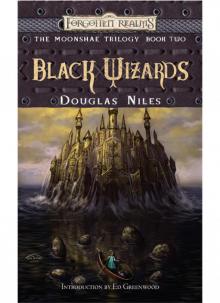 Black Wizards
Black Wizards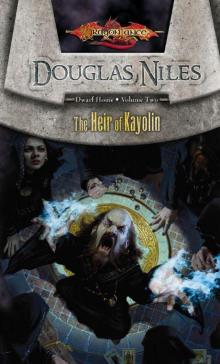 The Heir of Kayolin dh-2
The Heir of Kayolin dh-2 The Crown and the Sword tros-2
The Crown and the Sword tros-2 Realms of Valor a-1
Realms of Valor a-1 Wizards Conclave aom-5
Wizards Conclave aom-5 Fox On The Rhine
Fox On The Rhine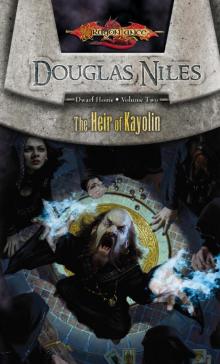 The Heir of Kayolin
The Heir of Kayolin Fox at the Front (Fox on the Rhine)
Fox at the Front (Fox on the Rhine) Measure and the Truth tros-3
Measure and the Truth tros-3 Emperor of Ansalon (d-3)
Emperor of Ansalon (d-3)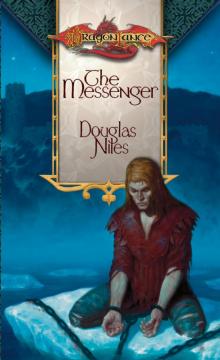 The Messenger it-1
The Messenger it-1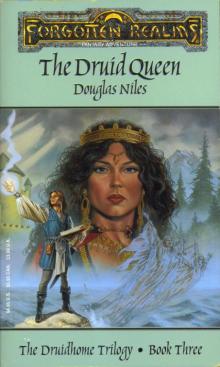 The Druid Queen tdt-3
The Druid Queen tdt-3 Ironhelm mt-1
Ironhelm mt-1 The Dragons lh-6
The Dragons lh-6 The Last Thane cw-1
The Last Thane cw-1 Circle at center sc-1
Circle at center sc-1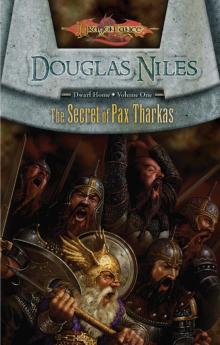 Secret of Pax Tharkas dh-1
Secret of Pax Tharkas dh-1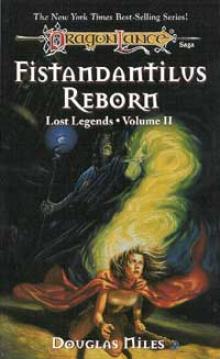 Fistanadantilus Reborn ll-2
Fistanadantilus Reborn ll-2 Viperhand mt-2
Viperhand mt-2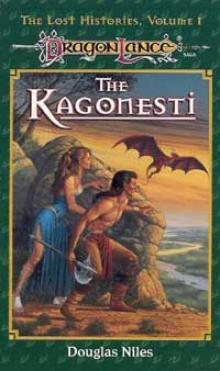 Kagonesti lh-1
Kagonesti lh-1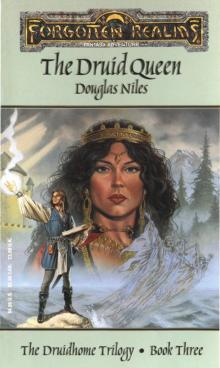 The Druid Queen
The Druid Queen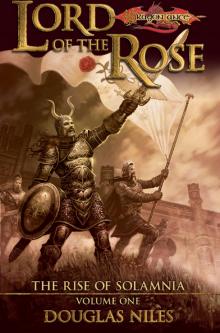 Lord of the Rose tros-1
Lord of the Rose tros-1 Goddess Worldweaver sc-3
Goddess Worldweaver sc-3 Eyeball to Eyeball (Final Failure)
Eyeball to Eyeball (Final Failure)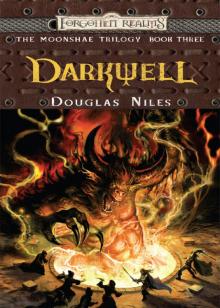 Darkwell
Darkwell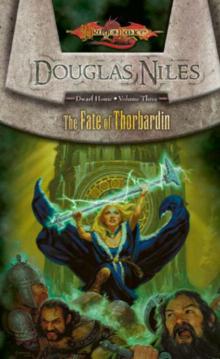 Fate of Thorbardin dh-3
Fate of Thorbardin dh-3 The Coral Kingdom tdt-2
The Coral Kingdom tdt-2 Wizard's Conclave
Wizard's Conclave The Coral Kingdom
The Coral Kingdom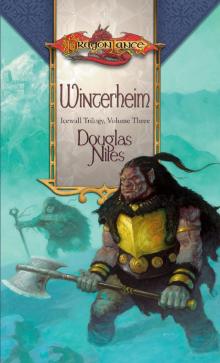 Winterheim it-3
Winterheim it-3 Emperor of Ansalon v-3
Emperor of Ansalon v-3 MacArthur's War: A Novel of the Invasion of Japan
MacArthur's War: A Novel of the Invasion of Japan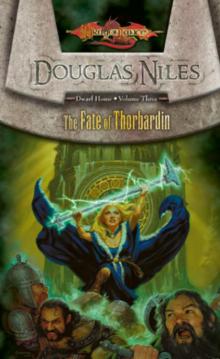 The Fate of Thorbardin
The Fate of Thorbardin The Rod of Seven Parts
The Rod of Seven Parts Fistandantilus Reborn
Fistandantilus Reborn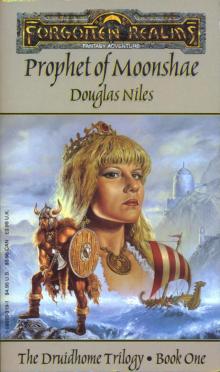 Prophet of Moonshae tdt-1
Prophet of Moonshae tdt-1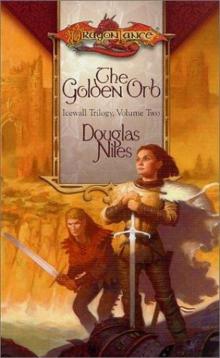 The Golden Orb i-2
The Golden Orb i-2